November 23, 2007
Air Date: November 23, 2007
FULL SHOW
SEGMENTS
Beijing's Challenge
/ Elise PotakaView the page for this story
With the Olympics a year away, Beijing is trying to clean its air. China's capital is adding new subway lines, and cutting bus fares in hopes that residents will take public transportation. But, with 1,000 new cars on the road every day, Beijing is up against a big challenge. Radio Deutsche Welle's Elise Potaka reports. (06:00)
Air Pollution of Olympic Proportions
View the page for this story
Chinese officials promised the summer's Beijing Olympics would be the greenest ever. They've made great strides but air pollution still remains a problem. Living on Earth host Steve Curwood talks with Nick Nuttal, spokesman for the United Nations Environment Program about UNEPs recent report on the Beijing Olympics. (05:15)
Clinton on Climate Change
View the page for this story
If she were president, what would Hillary Clinton do to combat climate change? Living on Earth host Steve Curwood moderated the first-ever presidential candidates forum on global warming, where Senator Clinton answered just that question. Tune in for a substantial discussion about one of the most serious issues the next commander-in-chief will face. (18:00)
Hot Book Picks
/ Bruce BarcottView the page for this story
From climate solutions to climbing trees....Outside magazine contributing editor Bruce Barcott tells us what’s on his list of the best environmental books of 2007. (03:15)
E-I-E-I-Endangered?
/ Bruce GellermanView the page for this story
If Old MacDonald still had his farm he might have animals like the ones Jennifer Cermak raises. Cermak, a fourth generation farmer, raises rare and endangered barnyard animals. LOE's Bruce Gellerman toured Cermak's Berlin Farms, just outside Boston, for a firsthand look at Sumatra and Sussex chickens and royal palm turkeys. (13:45)
Show Credits and Funders
Show Transcript
HOST: Steve Curwood
GUESTS: Nick Nuttal, Hillary Clinton
REPORTERS: Elise Potaka, Bruce Gellerman
COMMENTATOR: Bruce Barcott
[THEME]
CURWOOD: From Public Radio International, this is Living on Earth.
[THEME]
CURWOOD: I’m Steve Curwood.
Global warming may threaten to destroy civilization, but its gotten scant attention so far in the Presidential campaign. At the first-ever presidential forum on climate change, Democrat Hillary Clinton explained why:
CLINTON: When I speak, as I have now for the last eleven months, to tens of thousands of people and I say that we will do everything necessary to end our dependence on foreign oil people cheer. And then I always add ‘we will finally once and for all attack global warming.’ People sit there. The case has not yet been made and I know how hard that is for many of you who are activists and care deeply about this issue perhaps even to believe, let alone accept.
CURWOOD: Senator Hillary Clinton on Global Warming. Also our hot book picks for 2008 and more this week on Living on Earth. Stick around!
[MUSIC: Boards Of Canada “Zoetrope” from “In A Beautiful Place Out In The Country” (Warp Records 2000)]
Beijing's Challenge
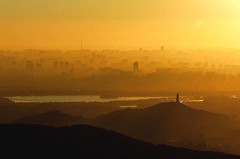
Sunrise through the smog in Beijing. (Photo: Flickr/Luo Shaoyang)
CURWOOD: From the Jennifer and Ted Stanley Studios in Somerville, Massachusetts—this is Living on Earth. I’m Steve Curwood. With the 2008 Olympics coming up in Beijing, there’s a lot of talk about air quality and traffic in the capital of China. One thousand new cars go on the road in Beijing every day, joining the three to four million cars that are already jamming the streets and threatening public health. Breath the air in Beijing and you're breathing the world’s highest levels of lung-damaging nitrous oxide, according to a recent study. As well las a lot of particulates.
So China is facing a big challenge: how to move people without choking them.
Radio Deutsche Welle’s Elise Potaka has our report from Beijing.
[SOUND OF BUSY STREET, HONKING, VEHICLES DRIVING]
POTAKA: A normal day on Beijing’s roads involves a lot of patience, as cars crawl along at a snail pace and the smog over the city deepens. With the Olympics less than a year away and government pledges to fix air quality and reduce China’s greenhouse impact, Beijing is working overtime to try and resolve its transport problems.
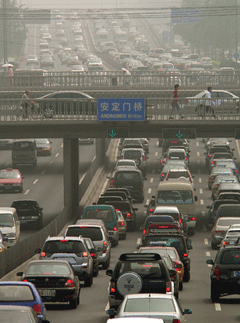
Traffic is often at a standstill in Beijing.
(Photo: Flickr/hldpn)
POTAKA: This month, the government opened its fifth subway line, cutting through the center of the city and heading out to the suburbs. There are another six lines in various stages of planning and construction. The government has also this year dramatically reduced the price of bus and subway tickets in efforts to encourage more public transport use.
[WOMAN SPEAKING IN CHINESE]
POTAKA: Outside Jangleman (SP?) subway station, this woman tells me that Beijing simply has too many people, and now, too many cars. She says that having cheaper subway tickets is a good idea, but the trains have become too crowded; it’s not safe.
[SOUND OF BUS PASSING]
POTAKA: The same goes for buses, where sometimes it seems you’d be better off walking to your destination. One big problem is the amount of tax, which the car industry injects into local GDP, making the central government unwilling to put limits on car consumption, says Lu Di Xong (SP?). He’s the senior engineer with the China Sustainable Transport Center.
XONG THROUGH INTERPRETER: The government needs to choose between economics and the environment and sustainable development. The money from the car industry can support the city’s development for only a short time, but sustainable means we need to look ahead 10, 20 years. You need to put money back in the environment, clean up air pollution, and pay the true cost of energy to be sustainable.
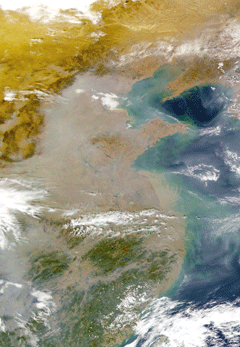
This SeaWiFS image of eastern China shows the extent of the country's pollution. Beijing has completely disappeared under the haze. (Photo: SeaWiFS Project, NASA/Goddard Space Flight Center, and ORBIMAGE)
POTAKA: Beijing was once famous as a great biking city. And this environmentally-friendly form of transport is often still the quickest way to get from A to B because of the city’s narrow lane ways and the wide bike lanes. But as Hu Wei Ju (SP?) from China’s Friends of Nature says, biking around Beijing is becoming less and less convenient.
JU: We have a regulation for the bike lane, but as far as I see, many bike lanes do not meet the regulation, and some of the bike lanes most of the time will be occupied by cars because we have too many cars.
POTAKA: Many Beijing bike riders take the city’s narrow alleyways, known as ‘hutongs,’ to try to avoid cars and pollution. But Beijing has implemented a new regulation, which is sending more cars into the backstreets in an attempt to free up some of the city’s main roads. Hu Whey Jo:
JU: The last year since—the last year in September, the transport traffic administration office in Beijing. They set up a new policy to encourage taxi drivers to use the small alleys and the narrow streets in Beijing, so—
POTAKA: You mean they are encouraging taxi drivers to get off the big roads like the 2nd Ring Road and take the narrow back streets—

Sunrise through the smog in Beijing. (Photo: Flickr/Luo Shaoyang)
[CARS DRIVING AND BICYCLE BELLS, MAN SPEAKING IN CHINESE]
POTAKA: This Beijing local tells me one problem with bike riding these days is that more and more people are living on the city’s outskirts, far away from their offices in the city’s center. Engineer Lu Di Xong agrees that urban planning, which factors in good public transport, is another big challenge.
XONG THROUGH INTERPRETER: A distance of more than nine miles isn’t suitable for a bicycle. So when people live far from the center of the city, they can’t ride their bicycles to work because the distance is too long. Our urban planners must plan good satellite towns, where people can live and work.
[CARS DRIVING]
POTAKA: At the same time, those working in the area of sustainable transport are realizing that trying to stop people from buying cars in China is not an easy task at the moment. Hu Wei Ju from Friends of Nature:
JU: People use a kind of standard to evaluate personal success with cars. So if you are reaching up or have a successful career, you should have a car, something like that. And maybe some people, they have worked for several years to have a car and it’s quite difficult to convince them to give up cars.
POTAKA: On a positive note, local governments around China have begun investing in bus rapid transit, a system where buses are given priority over other vehicles in order to reduce trip times. Hu Wei Ju and Lu Di Xong hope that as public transport options such as bus rapid transit expand, more and more car owners will choose to leave their vehicles at home. Elise Potaka, Beijing.
CURWOOD: Our report on transportation and pollution in Beijing comes to us, courtesy of Radio Deutsche Welle.
Related link:
Radio Deutsche Welle’s “Living Planet”
Air Pollution of Olympic Proportions
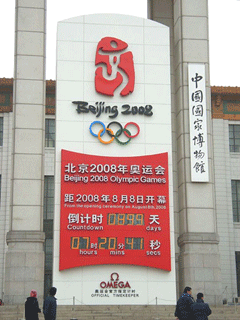
Countdown clock to the 2008 Beijing Olympic Games (Photo: Flickr/Gene Zhang)
CURWOOD: Chinese officials promise the Beijing Olympics and Paralympics to be held next August and September will be the greenest ever. But, the President of the International Olympic Committee says some events could be postponed when the air is unacceptable. The United Nations Environment Program recently published a report on the progress China has made to clean its environment in advance of the Olympics. UNEP spokesperson Nick Nuttal says China has come a long way….but there’s still a lot of room for improvement.
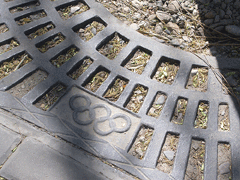
Some tourists say that everywhere you look, you see reminders that Beijing will be hosting the 2008 Summer Olympic Games. (Photo: Flickr/Oldtasty)
CURWOOD: So, what’s the most difficult problem they’ve had to tackle?
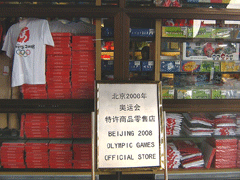
Buy early to beat the rush! Beijing stores are already selling 2008 Olympic souvenirs. (Photo: Flickr/Betta Design)
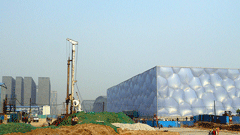
The semi-transparent National Aquatics Center is also known as 'The Water Cube.' (Photo: Flickr/Wolfiewolf)
NUTTAL: Well it’s difficult with the energy generation, I mentioned they have been assiduously trying to switch some of the coal-fired boilers to gas. There seems to be something of an opportunity with the transport network. They have now put in railway lines and subways and rapid bus transport for a considerable number of people. Indeed, the new lines that are being put in may well accommodate, I don’t know, something like four million people daily. But, there is an estimate that overall the capacity of the Beijing public transport network is about 19 million passengers a day and yet it’s being underutilized by about eight and a half million daily passengers. So, in other words, there’s a big opportunity to get more people out of their cars and onto public transport and that may be an opportunity, indeed, to actually reduce particle emissions.
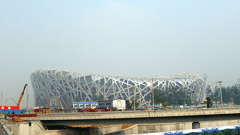
The National Arena has been popularly dubbed the "Bird's Nest." (Photo: Flickr/Wolfiewolf)
NUTTAL: Well, I mean, maybe it’s a question of the timing. Maybe they’re a scrum at rush hour whereas at the Olympics, for example, it may well be that events are going on all day and you can actually stagger in a sense the utilization of the network. I mean, that’s not unusual in many cities around the world where you get big pinpoints at rush hour.

Countdown clock to the 2008 Beijing Olympic Games (Photo: Flickr/Gene Zhang)
NUTTAL: Well, you know, China and the leadership right at the top of the Chinese government has made it abundantly clear in the last few years that they are extremely concerned about the economic costs of rising pollution in their country and they have set energy intensive targets for their industry, they’ve set renewable energy targets for their country, and I think the Olympic Games is a real opportunity for Beijing, but also for China generally, to become even more aware of the environmental challenge, of the climate challenge, of so many other similar related challenges, and also for millions of people around the world, sitting in living rooms in Boston, or in Berlin, or Bogota, or be aware of what’s happening to the planet right now and the absolute urgent need to move towards a more sufficient world, one that’s far less polluting. So, hopefully the games can act as a real catalyst for that, in China and beyond.
CURWOOD: Nick Nuttal is a spokesperson for the United Nations Environmental Programme in Nairobi. Thanks so much, Nick.
NUTTAL: Yep, thanks a lot.
Related links:
- For a link to the report on UNEP's Environmental Review of the 2008 Beijing Olympic Games click here.
- Beijing 2008 Olympic Games
[MUSIC: Beijing Olympics Q&A: David Byrne & Bryan Eno “Number 8 Mix” from My Life In The Bush Of Ghosts (Nonesuch 2006)]
Clinton on Climate Change
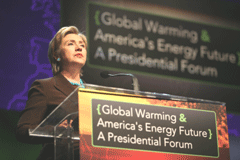
(Photo: Laura Kleinhenz)
CURWOOD: It’s Living on Earth. I’m Steve Curwood. New York Democratic Senator and presidential hopeful Hillary Clinton described an ambitious plan to tackle climate change when she took the stage at the first-ever presidential forum on global warming. I moderated the forum which took place in the Wadsworth Theatre in Los Angeles on November 17th. Senator Clinton says her plan would reduce the country’s global warming gas emissions 80 percent by mid century, and dramatically increase auto fuel efficiency and renewable sources of electricity. Here’s an excerpt from her remarks:
CLINTON: From day I take office as of noon on January 20th, 2009, I will issue an executive order that every new federal building has to be carbon neutral, from design to construction. I have proposed a $50 billion strategic energy fund to double investment in energy research and you know how we’ll pay for it—by taking the tax subsidies away from the oil companies because it’s clear they don’t need our money to make a high profit.
[APPLAUSE]
CLINTON: And I think it’s very important to start talking about green collar jobs. Everybody knows about blue collared jobs and white collar jobs, we’re going to put five million Americans to work making America green.
[APPLAUSE]
CLINTON: When I am president, the U.S. Treasury will issue energy independence bonds, dedicated to the strategic energy fund. I’ll encourage Americans to reduce their energy use and shrink their carbon footprint and place the savings into these bonds. During World War II, Americans purchased more than $33 billion dollars in war bonds. We can tap that same patriotism. After 9-11, this president said ‘go shopping.’ It was a tragic missed opportunity. As president I’ll say ‘go green.’ And I think that Americans will respond.
[APPLAUSE]
CURWOOD: Well, thank you so much, Senator. But here’s a difficult question: the last three presidents of the United States, each in their own way have declared that they’re going to take on climate change. George Bush, the elder signed the UN Framework Convention on Climate Change. Your husband’s administration signed the Kyoto Accord. When Mr. Bush was campaigning for office, he pledged that he would list carbon dioxide as a pollutant.
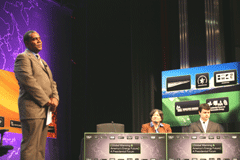
Forum moderator Steve Curwood, and panelists Mary Nichols of the California Air Resources Board and David Roberts of Grist Magazine. (Photo: Laura Kleinhenz)
CURWOOD: Well, the point is, is that every one of these men have said—
CLINTON: That’s the problem to start with, I think!
[AUDIENCE LAUGHS AND CHEERS]
CURWOOD: So, that’s your idea of a first. If you’re elected, you will not only be the first female president of the United States, but the first president of the United States, the first president of the United States to have an effective policy that would actually reduce our greenhouse gas emissions? So, how do you do this? These people all started with the intention of doing it; they weren’t able to deliver. What’s the magic you bring? What’s your secret that you can, in fact, deliver?
CLINTON: Well, number one: people’s awareness and understanding of this issue is much greater than it was, even seven years ago. And certainly 10 or 15 years ago. It is a combination of the news and people’s own experience that is beginning to kind of penetrate what people like Vice President Gore and some of you have been talking about for years. So that has a salience in the political system that we haven’t seen until very recently. Secondly, it is significant that we are moving toward a global commitment on this. If you look around the world and you see the actions that are being taken by the European Union or Japan, or you look and understand how much more renewable electricity is being generated by countries like Denmark or Germany and others, it ties into the sense among Americans that we’re just not keeping up. And we need, once again, to reassert our global leadership on an issue of significance. And finally, you have to have a commitment from a president at the time when the electorate and elected representatives are finally ready to act. And that’s what I think we will have when I become president. Because we have people in the Congress now who are much more open, much more dedicated than they ever have been before. We had a renewable portfolio standard in the House. We have CAFÉ standards in the Senate. That’s never happened in the last 10, 15 years. So there is a much greater readiness in the political system. So if it takes leadership, I would meet every three months with the leaders of the major greenhouse gas emitting countries. We have a group of countries—the EU, the United States, Canada and Mexico, Russia, China, India, Brazil, South Africa—that are basically responsible for 70 percent of the current greenhouse gas emissions and, I think, if presidential leadership drove this we would make progress internationally and here with a congressional agenda. So, I’m actually quite confident and optimistic that we can make this high priority and bring some very positive change about.
[APPLAUSE]
MARY NICHOLS: Thank you, Senator.
CURWOOD: Thank you. So the pledge is, it will be done in your administration, it will be done. That’s the pledge.
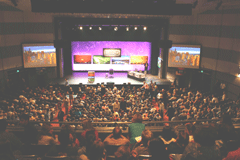
Los Angeles' Wadsworth Theatre shortly before the climate change forum began. (Photo: Laura Kleinhenz)
CURWOOD: When the Clinton administration is over, emissions will have been reduced in this country.
CLINTON: Yes.
CURWOOD All right, you heard the pledge.
[APPLAUSE]
NICHOLS: Okay, now, let, let’s talk about how the campaign can help to make this happen. I think we all remember what happened to healthcare.
CURWOOD: Panelist and California Air Resources Board Chair Mary Nichols.
NICHOLS: What can you do through the campaign and through your speeches and other actions in the places where climate isn’t yet on the agenda to give yourself what you need to combat what we know will be the multimillion dollar ad campaigns that will be coming at you and the rest of us from the coal industry and others—
CLINTON: Right.
NICHOLS: Opponents.
CLINTON: Well, I’m, I’m trying to do that in the campaign now, in that I rolled out this energy climate change agenda over a week in Iowa and New Hampshire. I speak about it everywhere that I go to try to kind of get it into the bloodstream of the presidential campaign. That’s the first issue, we’ve got to make it something that people you know, actually turn into a voting issue. And here’s where all of you come in, because you have to help this become a voting issue, not just in California, but in other states, as well. That’s why this forum is so significant because we need lots and lots of people who come to presidential events and not just the Democrats, but the Republicans, as well, asking questions, standing up and saying, ‘This is an important issue to me, personally, this will influence my vote.’ So, it’s a two-way street – the candidates have to be talking about it and then we need people who are already committed and active to turn it into a voting issue.
[APPLAUSE]
CLINTON: You know, I certainly remember very well healthcare. That taught me a lot of lessons. One was that everybody’s for change in general, but when it gets to be particular people start peeling off. And everybody is also worried that people in politics are not going to be pure enough, and then the perfect becomes the enemy of the good. So, as a, perhaps, thought that you might take away from this forum – there is no way that we will ever produce a piece of legislation that can get through the Congress that every one of you will agree with. But, incremental change in America, except in moments where the entire country recognizes we’re in a crisis, like being attacked at Pearl Harbor or we had that opportunity after 9/11 if there’d been another president, if Al Gore had been president we would have had an energy and climate change program after 9/11. But, when we actually go to the hard work of making the change then it’s going to be imperative that people stick together and that we stand united against the inevitable attacks coming from the other side. Because, ultimately, it is imperative that we get something passed and that we begin to implement it because that will persuade Americans that what we’re talking about is not going to be too disruptive, not going to undermine their quality of life or their standard of living, that it is actually going to create opportunities that are going to produce more jobs, that are going to lower their utility bills, that are going to give people a chance to make socially conscious choices. So, there’s a lot we can do, but we’re going to have to put together a very smart, broad-based political coalition to withstand, as you say, the inevitable attacks that will come.

Senator Hillary Clinton at the Presidential Forum on Global Warming and America's Energy Future.(Photo: Laura Kleinhenz)
CURWOOD: Thank you, Senator.
ROBERTS: Thank you, Senator.
CURWOOD: Panelist David Roberts of Grist-dot-org.
ROBERTS: Your last answer is a good segue into my question in that there is a bill currently in the Senate, currently going before your environment committee, the Lieberman/Warner cap-and-trade bill and here we have sort of test case of political pragmatism versus political idealism. If you ask environmental groups, this bill falls short of your stated principles and your plan in a number of ways- in the giveaways to polluters and the targets and a number of other ways. On the other hand, it does seem to be the bill that has a consensus, some bipartisan consensus behind it. So, I would like to know, very concretely, if the bill comes up for a vote as currently constituted, would you vote for it? What will you do to try to improve it? And would you ever consider voting it down and waiting for something better next session?
CLINTON: The bill needs a lot of improvement it is not the bill that I would write. It’s not that bill that Barbara Boxer would write, and I don’t think anybody can question Senator Boxer’s credentials as someone who stands and fights—
[APPLAUSE]
CLINTON: -- as hard as she can. And I think what Chairman Boxer, because she is the Chair now of the Environment Committee, is trying to do, is to improve the bill, create a context in which that bill can lay down a marker because we’re well aware that no matter what comes out of the Committee, there will be a big fight on the floor and if something were to pass the Senate and the House, it would likely be vetoed by George Bush. So, the question that people like Barbara Boxer and I are asking is—what is the strongest bill we can get out of the Environment Committee right now? And we’re not sure yet, because we’re still working on that. So, I can’t tell you how I will vote because I don’t know what the final bill is going to be. I want a cap-and-trade system with 100 percent auction. There are other, sort of benefits that go to the existing industries that are polluting . On the other hand, we have never gotten this far before. So I’m going to try to strengthen the bill, I’m going to continue to you know, work with my colleagues and see where we end up. But, at the end of the day, it really comes down to a, a very, you know, pragmatic assessment – is getting a bipartisan bill, where Republicans actually vote for something an important first step? And you can look at that from either perspective. Now, I’m told that there are a number of environmental groups that actually support Barbara’s strategy, I know there is at least one that is adamantly against it but there are a number that I’m told are supporting it. So, it’s not a cut or dried issue. Uh, I know people are turning it into a political issue, it’s the political season, there’s one environmental group running ads against me in Iowa, basically saying that if I don’t vote against the bill in Committee, there’s something, you know, terribly wrong with me – and I, that is not useful, that gets back to the point that I said earlier – this is hard work and Democrats now are in charge by a very narrow margin in the Senate, we have one of our leading environmentalists, Barbara Boxer, chairing the Committee, I think we ought to give her a little more credit for political smarts than whatever this group is claiming in Iowa. So I don’t know where we’re going to end up, but we’re trying to make it stronger.
[APPLAUSE]
CURWOOD: There’s not much time left, Senator, but, I wanted to turn it in another direction for a moment. Uh, that’s in foreign policy in this question of climate change. Uh, this country’s in a very difficult position – we pledged as part of the Kyoto Process that we would go first, instead we’ve been pointing our finger at China and India saying, ‘we’ll they’re not doing anything, why should, why should we?' Um, we have a billion people, the IPCC says that are at a great risk of going hungry or getting drowned because of the effects of climate change – how would you restore America’s credibility in the foreign policy community on this issue of climate change?
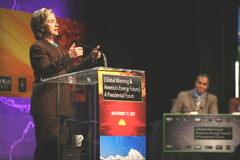
Steve Curwood listens on while Senator Clinton grabs the crowd. (Photo: Laura Kleinhenz)
[LAUGHTER, APPLAUSE]
CLINTON: -- and I think that—that’s why I emphasize taking leadership on a, in a post-Kyoto world. I’m hoping that we get a good framework coming out of Bali and then in the follow-on meetings but I think it’s clear that the Administration won’t do anything of any significance – and, so, they’ll leave office, we will have lost eight years and we’ll have to play a lot of catch-up. So, I intend to immediately move to try to convene a meeting of the countries that are the biggest emitters, including China and India. I think it is somewhat bad form for the United States to be pointing fingers at China and India, since we have by far, emitted more greenhouse gas emissions over the last century than they have and they are going to rapidly, unfortunately, make up lost time, unless they begin to change. So, I think we need to do several things simultaneously
I think there’s a lot that we could do together with China and India and it’s especially important with China because I don’t think that we want to be in a position of looking as though we are trying to slow down the rising living standard in China—that is not going to be a very convincing argument to make to the Chinese government or the Chinese people. But, if we’re willing to say, as I say in my plan—look, if you’re going to continue to use coal, you have got to have immediately demonstration projects about carbon sequestration and you’ve got to move immediately to see what kind of technological fixes there are and why don’t we work with China to have some of those demonstration projects there. If you’re going to be focusing on renewables instead of trying to have a nuclear deal with India as the only way we’re trying to help India’s energy shortages, why don’t we talk about solar arrays, why don’t we talk about wind, why don’t we talk about geothermal, and actually use some of our foreign aid and our expertise – not just from the public sector but from the private sector and the not-for-profit sector, to set up some demonstration projects. We need to show countries like India and China that we’re not trying to slow their development down, we’re trying to actually jump start their development in a way that doesn’t choke them and choke the rest of the planet. And I think if we approached it with the right attitude, with leaders that were willing to listen, as well as talk, you know, it’s, it is very difficult to listen to the Bush administration because it’s a one-way conversation and there isn’t any give-or-take or people feeling that their needs or their views of the world are taken into account. But there is no reason we can’t do this. And I think that you know, having Vice President Gore get the Nobel Peace Prize for the work he’s done for three decades--
[APPLAUSE]
CLINTON: -- you know gives us [APPLAUSE] gives us a, a, you know, a spokesperson who has great credibility internationally and, as soon as we see the end of the Bush Administration, will, I believe have great credibility in our government again. So, that’s the way that I would proceed--
[APPLAUSE]
CLINTON: -- in reaching out and working with other governments and with the international community – thank you all very much.
[MUSIC: Hillary Clinton Forum: Morphine “Bo’s Veranda” from B Sides and Otherwise (Rykodisc 1997) AND APPLAUSE]
CURWOOD: Thank you so much, Senator. That’s a great job.
CURWOOD: Senator Hillary Clinton at the Presidential Forum on Global Warming and America’s Energy Future in Los Angeles. To listen to the entire presidential forum go to our website loe-dot-org. Next week we’ll hear from Senator John Edwards.
The event was organized by groups affiliated with the League of Conservation Voters, the Center for American Progress, the Natural Resources Defense Council, and the Presidential Forum on Renewable Energy. And a special thanks to panelists David Roberts of Grist Online and Mary Nichols of the California Air Resources Board.
Related links:
- Rough transcript of "A Presidential Forum: Global Warming & America's Energy Future"
- Energy and climate plans from Hillary Clinton
- Energy and climate plans from John Edwards
- Energy and climate plans from Dennis Kucinich
- Forum panelist and Grist Magazine staff writer David Roberts' reflections on the event
- To see a video of the complete presidential forum on climate change click here
[MUSIC: Karl Denson “Who Are You?” from Dance Lesson #2]
CURWOOD: Just ahead farm animals Old MacDonald would have remembered. Keep listening to Living on Earth:
ANNOUNCER: Support for Living on Earth comes for the environmental health desk at Living on Earth comes from the Cedar Tree Foundation. Support also comes from the Richard and Rhoda Goldman Fund for coverage of population and the environment. This is Living on Earth on PRI: Public Radio International.
Hot Book Picks
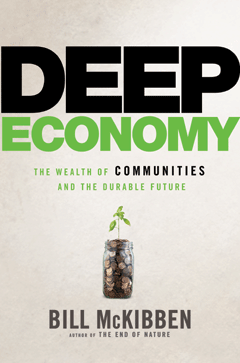
Bill McKibben's "Deep Economy: The Wealth of Communities and the Durable Future" (Photo: Henry and Holt Co.)
CURWOOD: It’s Living on Earth. I’m Steve Curwood. If you’re thinking of some gifts to buy for friends and family this holiday season, you might want to take a listen to Bruce Barcott. He’s a contributing editor of Outside magazine and he’s got some suggestions if you’d like to give those folks some brain food, otherwise known as books. Here’s Bruce Barcott’s list of favorite environmental books for 2007.
BARCOTT: Last year, bookstores were full of titles that documented global warming. This year, we moved on to books that told us what to do about it. The best of the bunch was “Break Through,” by Michael Shellenberger and Ted Nordhaus. Three years ago the authors raised a ruckus with their provocative essay, “The Death of Environmentalism.”
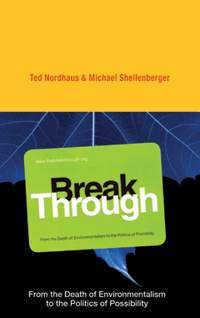
Ted Nordhaus and Michael Shellenberger's "Break Through: From the Death of Environmentalism to the Politics of Possibility" (Photo: Houghton Mifflin Company)

Bill McKibben's "Deep Economy: The Wealth of Communities and the Durable Future"(Photo: Henry and Holt Co.)
The year’s best book of natural history is paleontologist Michael Novacek’s “Terra.” Novacek lays out the story of life on Earth, from the first single-celled organisms to those strange hominids known as you and me. Novacek’s specialty is evolution and extinction, and his book makes it clear that habitat loss and global warming are bringing about the kind of mass extinction that hasn’t been seen since a killer asteroid wiped out the dinosaurs.
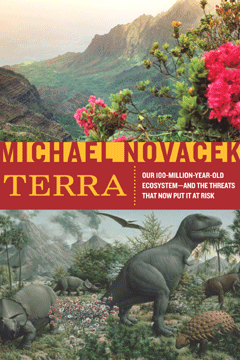
Michael Novacek's "Terra: Our 100-Million-Year-Ols Ecosystem- and the Threats That Now Put It At Risk"
(Photo: Farrar, Straus and Giroux)
Dangerous, but also glorious. For me, 2007 will be the year that Richard Preston inspired me to quit hugging trees and start climbing them.
CURWOOD: Bruce Barcott climbs trees in Boulder, Colorado and reviews books for Outside magazine and The New York Times Book Review. His own book, "The Last Flight of the Scarlet Macaw," will be published by Random House early next year.
Related links:
- Bill McKibben's "Deep Economy: The Wealth of Communities and the Durable Future"
- Richard Preston's "The Wild Trees: A Story of Passion and Daring"
- Ted Nordhaus and Michael Shellenberger's "Break Through: From the Death of Environmentalism to the Politics of Possibility"
- Michael Novacek's "Terra: Our 100-Million-Year-Ols Ecosystem- and the Threats That Now Put It At Risk"
E-I-E-I-Endangered?
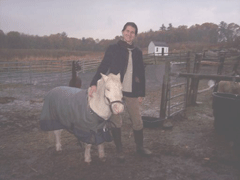
Jennifer Cermak with Sugar the mini horse (Photo: Bruce Gellerman)
[ROOSTER CROWS]
CURWOOD: The sound is familiar, but the site and situation are a bit unusual. Welcome to Berlin Farms. Located about 40 miles west of Boston, at the edge of suburbia, this is no ordinary farm. Here, for the past two years, Jennifer Cermak has been saving endangered farm animals from extinction. These are not your run-of-the-mill chickens, horses, turkeys, rabbits and sheep, but animals with long heritages that are small in numbers.
Jennifer Cermak is a fourth generation farmer with a PhD in the science of memory and development. She bought Berlin farms and converted it into a place to protect the rare animals. She also turned the farmhouse into a restaurant and a farm stand where she sells local food and products. Living On Earth’s Bruce Gellerman visited Jennifer Cermak down on the farm.
CERMAK: Believe it or not but there are a lot of endangered barnyard animals because there are so few small farms in existence. There are a lot of commercial farms that will carry one breed, for example, one breed of New Holland turkey but because there was a great breed diversity in the mid to late 1800s, we’ve lost that breed diversity as we’ve gone to large, commercial farms.
GELLERMAN: So you’re protecting endangered farm animals?
CERMAK: Yes. I think most people think in terms of endangered rainforests, endangered African wildlife, and they don’t realize that this is a problem in their own backyard.
GELLERMAN: How big a problem? And, I haven’t noticed it, to be honest with you.
CERMAK: Sure. And that’s because most people don’t live in an agricultural zone and have the hands-on access and experience to what’s going on in those farms. For example, one of our chickens—there’s probably only 500 left in the United States, which puts them on a critical list.
GELLERMAN: What kind of chickens?
CERMAK: They’re called Sumatra. They’re a big—or a smaller, very fancy-looking, black chicken.
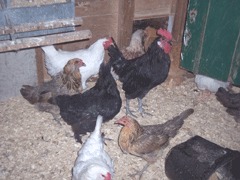
Fewer than 500 of these rare Sumatra chickens exist in the country today. (Photo: Bruce Gellerman)
CERMAK: Absolutely.
[SOUND OF FOOTSTEPS AND DOOR OPENING]
CERMAK: We’ll have to see who’ll come out. Because of the rain, I think everyone wants to stay indoors dry. We’ll go fish him out.
[DOOR OPENS]
GELLERMAN: Whoa, look at those birds!
CERMAK: So if you see the big fancy black ones with the long tails—the three of them. Those are Sumatras. And right here we have a Speckled Sussex and a Rhode Island Red.
GELLERMAN: The Sussex—is it rare?
CERMAK: Yes, they are. All of these are on watch lists, either critical or endangered, based on their numbers in the United States.
GELLERMAN: Where do you get them from?
CERMAK: So you have to buy birds—in the state of Massachusetts—from people that have licensed approval. You can’t just ship birds across state lines—
[ROOSTER CROWS]
CERMAK: -- from non-accredited hatcheries.
GELLERMAN: What are you going to do with them? Are you going to breed them or am I going to have it in a potpie someday?
CERMAK: (laughs) Right. So, this is a no-kill farm. So what we do is sell the chicken eggs. So we sell chicken and turkey eggs. And we also use it in our baking. We have a brunch service Monday through—uh, Saturday and Sunday. And we use the eggs in omelets and pies, things like that.
[ROOSTER CROWS]
GELLERMAN: They really do that.
CERMAK: They really do. And they start at about 3 o’clock in the morning. So I think one starts and the others start challenging it and it goes from there all day. (Laughs) So you don’t want to have very close neighbors.
GELLERMAN: So what are these animals here? I’ve never seen—what is it a turkey or something?
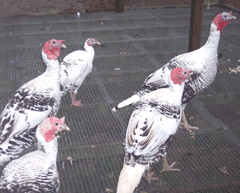
Jennifer's royal palm turkeys. Only around 10,000 of this breed exist in the country. (Photo: Bruce Gellerman)
GELLERMAN: And what do you do with them?
CERMAK: We use their eggs. They have a really nice, big egg. It’s great for baking. It tastes like a chicken egg. You can’t really see but they have a—if they turn around, they have a beautiful blue face and an orangish red head. And they’re very docile. I mean, one thing you find out quickly when you’re raising different kinds of birds and chicken—is that some are inherently a little nastier than others and some are just sweet as pie. These guys are really friendly. I hand raised them. Hi guys!
[TURKEYS CHIRP]
CERMAK: So typically a commercial farm might raise all one bird, like a New Holland. So what we’ll be doing next season is bringing in most likely a chocolate turkey, which is on a critical list. So, because we’re not required to provide a thousand turkeys for the holiday season for table, we have the ability to bring in a few rare turkeys and raise them and breed them and let them live out their life expectancies and provide eggs.
GELLERMAN: You know, you’re solving a problem I never knew we had.
CERMAK: Yes, I think a lot of people aren’t exposed to agriculture like they were before. One of the difficulties in running a farm like this is being able to find people that have the know-how, that aren’t afraid of chickens, that know how to take care of horses.
GELLERMAN: So they’re endangered, too.
CERMAK: Yes, people that have farming experience, that know when an animal is sick or okay, it’s very difficult to find. So, I’m going to show you the Southdowns. The Southdown sheep are recovering, which is also fantastic. They were an endangered breed as well. We’re just going to grab some hay and go feed them. And you’ll find what’s neat about them is they’re extremely docile and part of what makes your farming easier if you’re dealing with animals that aren’t going to give you any trouble, that aren’t going to ram you when you’ve turned around and aren’t looking. That’s quite unpleasant.
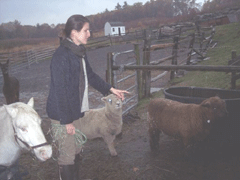
Jennifer with her Southdown sheep. (Photo: Bruce Gellerman)
CERMAK: (laughs) Sorry.
GELLERMAN: Oh my!
CERMAK: That’s right. This is the menagerie.
GELLERMAN: Holy cow. That’s—an alpaca?
CERMAK: That’s an alpaca and his—he’s a South American animal originally and he’s not endangered. He keeps the sheep safe. So, coyotes don’t like alpacas. We have a ton of coyotes here. So the alpaca guards the herd.
[GATE OPENS]
CERMAK: You’re a good boy!
GELLERMAN: So what will you do with the sheep?
CERAK: So we’re going to breed them as well.
GELLERMAN: Jennifer, if you could have one pair of animals that is endangered, what would it be?
CERMAK: Oh um—
[BELL RINGS]
CERMAK: I would have to say, and this is just because I was one of those schoolgirls that took lessons out of elementary school, it would have to be the horses. Um, I just love—there are endangered horses as well. We have a Freisian that is. But you know, I love to ride. So for me it would serve a dual purpose—I’d be able to ride and be helping this cause as well.
GELLERMAN: So is this a lifelong dream for you or you just kind of woke up one day and said ‘you know, I’ve got to go save endangered farm animals?’
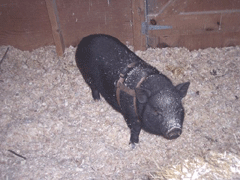
Bella the pot-bellied pig at Berlin Farms. (Photo: Bruce Gellerman)
So the other thing I really didn’t know about being a farmer is you need to be a mechanic, and that’s a little hard. So you have to be able to fix your own tractor and I haven’t learned how to do that yet, so that’s my biggest trouble because that thing breaks down every five minutes. So um, what you’re looking at is a Polish. He doesn’t have a lot of meat on him. He’s a smaller chicken.
GELLERMAN: He looks like almost, what, I don’t know what.
CERMAK: He’s very fancy looking. And you can see, which is probably why he is endangered, he’s not one of these big-breasted roasters that falls over on itself. And you can see these birds are a little more delicate than you’d expect at table.

Jennifer Cermak with Sugar the mini horse (Photo: Bruce Gellerman)
CERMAK: He’s called a Polish.
GELLERMAN: How many of those are there in this country, do you know?
CERMAK: Um, they are on a watch list. Maybe about 5,000 if I had to guess.
GELLERMAN: Now, the USDA—
CERMAK: Yes.
GELLERMAN: Does it categorize farm animals as endangered?
CERMAK: Not that I’m aware of. I believe the wildlife and fisheries organization categorizes native animals and most of these breeds were brought over from England, Europe, Asia, 1800s mid to late and that’s when the breed registries were started and we started counting how many of a particular breed that we had. And obviously at that time most people had chickens in their backyard and did maintain some amount of agriculture so you could have breed diversity. And now big commercial farms aren’t interested in maintaining these breeds, obviously because of the economics aren’t there for them. Um, but it is important to maintain breed diversity and to keep not only numbers of a particular bird but flocks of a bird in different areas should a disease break out. That there are a number of breeding areas.
So this is really a treat that this can stay open to the public with people visiting and seeing these kinds of birds. Obviously, with a big, commercial facility you might not want someone off the street walking in and carrying you don’t know what on their shoes, and making a large population of birds sick. I mean, some of these hatcheries have 300,000 birds.
GELLERMAN: So you’re kind of part of agrotourism.
CERMAK: That’s right. That’s right. I’m not sure how many people have heard that phrase but people have very little exposure to agriculture and now that’s a new business—agrotourism. Showing people how to farm, giving them access to animals they’re not allowed to have in their neighborhoods, and providing them a large space that’s serene, where they can come with their families and enjoy themselves.
What’s challenging as an owner of one of these farms is the liability. You’re taking families that may or may not have experience with animals, that may or may not be doing different things that put themselves at risk, whether it’s in the simplest form that they don’t know that they’re looking at a chicken, when they see these chickens. And it’s great you can tell them what they’re looking at. And in other times you just get people that just don’t have judgment and—
GELLERMAN: It’s not wrapped in plastic.
CERMAK: (laughs) That’s right. That’s right. So, these guys have beaks and they peck and they have feelings. And the reason, I believe, that these guys are not very aggressive is because we’re very gentle with them.
[ROOSTER CROWS, CELL PHONE RINGS]
GELLERMAN: What is that?
CERMAK: That’s my phone.
GELLERMAN: Oh, so you do have some modern technology here.
CERMAK: I do, I have my Blackberry from work so it keeps me on schedule. I probably have some reminder popping up about something. What’s good about some modernization is I can find animals across the country that would be very difficult for me to source. So I can go on the Internet and find a rare breed that’s in Texas, I know that there’s a breeder there and talk to them about purchasing one of the animals. Hey gang! What’s going on? This is Bruce!
GELLERMAN: They don’t seem to care.
CERMAK: They don’t seem to care. They’re very inquisitive. I’ll try to see if there are any eggs, if anyone did any work. Nothing. So, that’s another point with the patience that it requires to care for some of these breeds. If you were a commercial chicken, and you weren’t putting out your egg quota because you’re getting older, you’d get put to market. With us, if they have a slow day and they’re not laying as many eggs, that’s okay.
[FOOTSTEPS]
CERMAK: And we’re back to the cow barn.
GELLERMAN: You have big plans.
CERMAK: We do. We have a lot of work ahead of us. We’ve done our winterizing for the animals so they’re ready for winter. Their jackets are all in or ordered and now we’ll spend the winter making the basement look nice.
[MUSIC PLAYS]
GELLERMAN: You already got your music. Is that Christmas music already?
CERMAK: It is. It is. It’s Louis Armstrong.
[MUSIC: Louis Armstrong “What A Wonderful World” from ‘The Joy Of Christmas Past’ (GRP Records—1994)]
CURWOOD: Oh yeah. Farmer Jennifer Cermak at Berlin Farms in Massachusetts, where she’s saving endangered barnyard animals. She spoke with Living on Earth’s Bruce Gellerman.
[MUSIC: Louis Armstrong “Hestitating Blues” from ‘Louis Armstrong: An American Icon’ (Hip-O Records—1998)]
CURWOOD: Next time on Living on Earth: he says the oil companies are blocking progress in the fight against global warming. Presidential candidate John Edwards says the public is looking for a leader who will take action.
EDWARDS: I think actually, the American people are ready for a president who calls on them to sacrifice and asks them to be patriotic about something other than war.
CURWOOD: Democrat John Edwards on the next Living on Earth.
CURWOOD: Living on Earth is produced by the World Media Foundation. Our crew includes Ashley Ahearn, Bobby Bascomb, Eileen Bolinsky, Bruce Gellerman, Ingrid Lobet, Helen Palmer, Emily Taylor, and Jeff Young. Our interns are Alexandra Gutierrez and Mitra Taj. Jeff Turton is our technical director. Alison Lirish Dean composed our themes. You can find us at loe.org. I’m Steve Curwood. Thanks for listening.
ANNOUNCER: Funding for Living on Earth comes from the National Science Foundation, supporting coverage of emerging science. And Stonyfield Farm: organic yogurt and smoothies. Stonyfield pays its farmers not to use artificial growth hormones on their cows. Details at Stonyfield.com. Support also comes from you our listeners, the Ford Foundation, the Town Creek Foundation, the Oak Foundation, supporting coverage of climate change and marine issues, and Pax World Mutual Funds, socially and environmentally sustainable investing. Pax World: for tomorrow. On the Web at PaxWorld.com.
ANNOUNCER 2: PRI: Public Radio International.
Living on Earth wants to hear from you!
Living on Earth
62 Calef Highway, Suite 212
Lee, NH 03861
Telephone: 617-287-4121
E-mail: comments@loe.org
Newsletter [Click here]
Donate to Living on Earth!
Living on Earth is an independent media program and relies entirely on contributions from listeners and institutions supporting public service. Please donate now to preserve an independent environmental voice.
NewsletterLiving on Earth offers a weekly delivery of the show's rundown to your mailbox. Sign up for our newsletter today!
 Sailors For The Sea: Be the change you want to sea.
Sailors For The Sea: Be the change you want to sea.
 The Grantham Foundation for the Protection of the Environment: Committed to protecting and improving the health of the global environment.
The Grantham Foundation for the Protection of the Environment: Committed to protecting and improving the health of the global environment.
 Contribute to Living on Earth and receive, as our gift to you, an archival print of one of Mark Seth Lender's extraordinary wildlife photographs. Follow the link to see Mark's current collection of photographs.
Contribute to Living on Earth and receive, as our gift to you, an archival print of one of Mark Seth Lender's extraordinary wildlife photographs. Follow the link to see Mark's current collection of photographs.
 Buy a signed copy of Mark Seth Lender's book Smeagull the Seagull & support Living on Earth
Buy a signed copy of Mark Seth Lender's book Smeagull the Seagull & support Living on Earth

